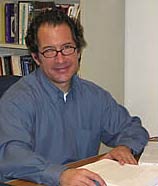Last night I went to a lecture and responding lecture hosted by the Carl F.H. Henry Center for Theological Understanding at Trinity Evangelical Divinity School. The lecture, presented by Jordan Ballor, was entitled “Theology and Economics: A Match from Heaven?” The response came from Stephen Long.
Read more about this lecture here.
View video of the lectures here.
The following are some thoughts and notes I wrote down during this discussion.
 Jordan Ballor // Thesis – That economics and theology are fundamentally compatible and mutually dependent. A continued separation or divorce between economics and theology would be harmful. We need economically informed theologians and theologically informed economists.
Jordan Ballor // Thesis – That economics and theology are fundamentally compatible and mutually dependent. A continued separation or divorce between economics and theology would be harmful. We need economically informed theologians and theologically informed economists.
- We must not merely have a heart, but also a head for the poor. Piety is no excuse for lack of technique. Good intentions are not enough.
- An economics informed by theology will be an anti-utopian, anti-ideological, disillusioning “truth bomb.”
- An economics informed by theology will acknowledge economic problems as more than merely economic.
- A danger of divorcing theology and economics is leaning uncritically on one economic ideology—indoctrination.
- While the Bible provides principles for economics, it doesn’t present us with a particular system. And no system available or possible is perfect.
- We have a tendency to apply certain Biblical principles to certain specific economic policies that fit our fancy. This tendency tends to coincide with a Christendon-type view of one’s society and ought to be heavily criticized.
- The history of economics is the history of theology integrated.
- The Church doesn’t not have an economic “yes”-voice for any specific economic policy. Rather, it has an economic “no”-voice. The Church needs to have a “prophet ‘no’-voice” to economic policies and all economic ideologies as such. He cited this article, “Carl Henry Was Right.”
 Stephen Long.
Stephen Long.
Thesis #1 – Theological orthodoxy may require economic heterodoxy, i.e., resisting the normative view of economics.
Thesis #2 – Economics is utterly dependent on theology; but theology is not dependent on economics.
- Theology must include economics to be true to its own character.
- Economics is not merely an issue of facts, but values; and, therefore, economics has everything to do with theology which is also concerned with values. Therefore, economics—even if it is orthodoxy (i.e., the normative reigning system)—must be subject to theological critique.
- Economics is dependent on theology by presupposing a certain ethic and metaphysic.
- God is an end in Himself. We cannot boil theology down merely to an instrumental use such as using theology of God for the purpose of economics. Theology is not dependent on economics to be something. Sure, theology is practically valuable; but we shouldn’t have to justify its worthwhileness by showing it’s practicality. Knowing God is a good enough end in itself.
- The Church cannot be a people who gains from other people’s misery. We need to be realistic about how things really are.
Thanks for posting this material.
LikeLike